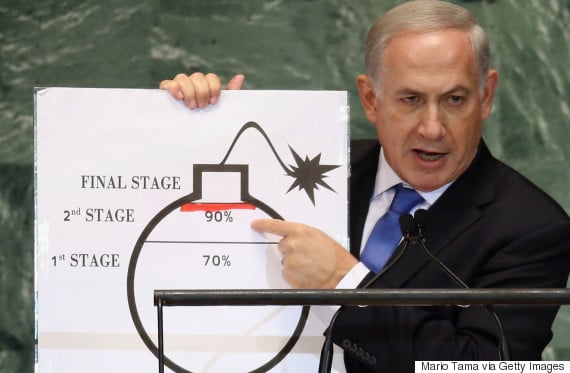
NEW YORK, NY – SEPTEMBER 27: Benjamin Netanyahu, Prime Minister of Israel, points to a red line he drew on a graphic of a bomb while addressing the United Nations General Assembly.
Israeli Prime Minister Benjamin Netanyahu just addressed the American Jewish community via live webcast. He spoke for 10 minutes, followed up with a 10 minute question and answer.
All of his standard arguments against the deal were there; he didn’t cover too much new ground. But there were some interesting tidbits.
For one, he re-stated the idea that giving Iran 24-days notice of inspection was like giving several weeks notice to a drug dealer that you’ll be raiding their labs. It’s a great talking point, and he’s used it before. The problem is that the response is stronger than the accusation.
FACT: The half-life of uranium is 700 million years. That’s 10 billion 24-day periods. It will be detected, thanks to the #IranDeal. — The Iran Deal (@TheIranDeal) July 23, 2015
Secretary of Energy Ernest Moniz, one of the architects of the Iran deal — and an MIT trained nuclear scientist — prefers to refute this line with an example of Iran from 2003.
“In February 2003, the IAEA requested access to a suspicious facility in Tehran, and negotiations dragged on as Iran tried to remove evidence. But even after six months, tests revealed nuclear activity despite Iran’s attempt to cover it up.”
Netanyahu commented that after receiving notice, Iran would flush their “nuclear meth” in order to hide it from inspectors. It’s powerful language that conjures criminal mastermind Walter White, the main character in the award-winning show “Breaking Bad,” outsmarting the authorities, season after season. But it’s not in line with the facts, and Netanyahu surely knows that. It undermines his position to use talking points that are so blatantly without merit. He clearly believes deep in his heart than this deal is bad — for Israel, the U.S. and the world. But he won’t win his argument through manipulation.
Netanyahu argues that he is not against all deals, only this deal. The glaring problem here is that he is been vocally, vehemently and vociferously against this deal since well before this deal even existed. He says he believes a better deal could have been reached. The Obama administration is just as vehement in their rejections. But it doesn’t matter. Bibi has been talking about a better deal for years! He is the face of all global opposition to this deal, he seems to see himself the leader of a movement, bent on preventing the actualization of this deal. He has thus made himself irrelevant as a force for change. He’s been arguing, since 1993, that Iran is just years away from a nuclear weapon. How can anyone take seriously the Bibi who cried bomb?
The most glaring issue with his remarks, however, revolved around Israel’s neighbor’s reactions to the agreement. When Bibi first came out against the deal, he pointed out that both Israel and the Arab states were against it. He posed the question: How often do Israel and our Arab neighbors see eye-to-eye on anything?
It’s a powerful argument. Israel was against the deal, so too Saudi Arabia and their Arab allies.
But the day before this speech, the Washington Post reported that during a visit from Secretary of State Kerry, the Persian Gulf Arab states had publicly endorsed the Iran nuclear deal. They continued:
“The GCC (Gulf Cooperation Council) support leaves Israel as the only country in the Middle East to vehemently oppose the agreement.”
This is extremely problematic for Netanyahu since he is supposed to be the learned teacher, patiently explaining why this deal is so bad for the entire world. Ignoring such developments make him look either dishonest or uninformed. Neither are great traits for the leader of a movement, especially not one as serious as this.
Follow me on Twitter @jlemonsk.